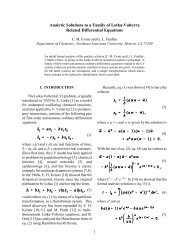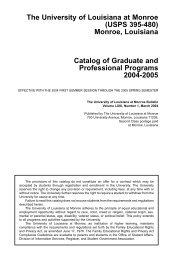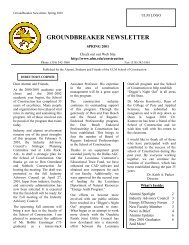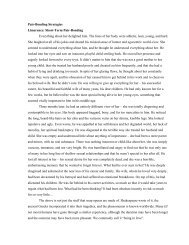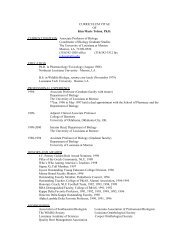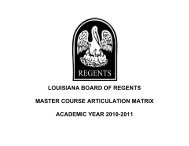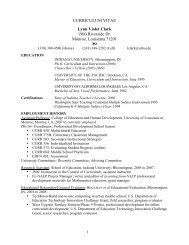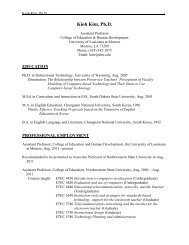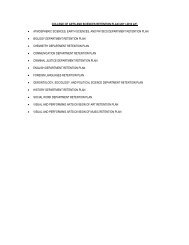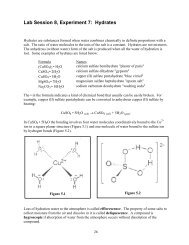08-09 Graduate Catalog/w pics - University of Louisiana at Monroe
08-09 Graduate Catalog/w pics - University of Louisiana at Monroe
08-09 Graduate Catalog/w pics - University of Louisiana at Monroe
You also want an ePaper? Increase the reach of your titles
YUMPU automatically turns print PDFs into web optimized ePapers that Google loves.
188 THE UNIVERSITY OF LOUISIANA AT MONROE<br />
commercial excess general and medical malpractice liability insurance administered<br />
through the St<strong>at</strong>e <strong>of</strong> <strong>Louisiana</strong> Office <strong>of</strong> Risk Management for itself, its agents, <strong>of</strong>ficers,<br />
employees and students. This coverage can be viewed from the web site loc<strong>at</strong>ed <strong>at</strong>:<br />
http://doa.louisiana.gov/orm/pdf/uwsumm.pdf Primary Commercial General Liability<br />
coverage is underwritten by the <strong>Louisiana</strong> Self-Insurance Fund (Self insured by the <strong>of</strong>fice<br />
<strong>of</strong> Risk Management) and provides $5,000,000 per occurrence (no aggreg<strong>at</strong>e).<br />
Miscellaneous Tort Liability coverage is underwritten by the <strong>Louisiana</strong> Self-Insurance Fund<br />
and provides comprehensive umbrella excess <strong>of</strong> $5,000,000 per occurrence. The student<br />
pr<strong>of</strong>essional liability insurance does not cover students when employed outside the<br />
curriculum.<br />
PHARMACY INTERN PERMITS<br />
Students admitted to the pr<strong>of</strong>essional program must apply for an active pharmacy<br />
intern permit during the first semester following enrollment into the pr<strong>of</strong>essional program<br />
and maintain the intern permit continually throughout enrollment in the pr<strong>of</strong>essional<br />
program. Students found to be in viol<strong>at</strong>ion <strong>of</strong> the regul<strong>at</strong>ions <strong>of</strong> the <strong>Louisiana</strong> Board <strong>of</strong><br />
Pharmacy may be required to resign their enrollment.<br />
RANDOM DRUG SCREENING REQUIREMENTS<br />
In the interest <strong>of</strong> public health and safety, all students enrolling in the pr<strong>of</strong>essional<br />
program <strong>of</strong> the College <strong>of</strong> Pharmacy are subject to random drug screening. Such tests are<br />
conducted by independent labor<strong>at</strong>ories and test results are reported directly to the College<br />
<strong>of</strong> Pharmacy. Results <strong>of</strong> random drug screenings will also be reported to <strong>Louisiana</strong> St<strong>at</strong>e<br />
Board <strong>of</strong> Pharmacy.<br />
TECHNICAL STANDARDS<br />
The goal <strong>of</strong> the College <strong>of</strong> Pharmacy is to broadly prepare students to practice<br />
pharmacy with special emphasis on practicing in primary care settings. Regardless <strong>of</strong> the<br />
eventual type <strong>of</strong> practice (i.e., community, clinic, or health care system), students must<br />
demonstr<strong>at</strong>e competence in intellectual, physical and social tasks th<strong>at</strong> together represent<br />
the fundamentals <strong>of</strong> being able to provide contemporary pharmaceutical care. Students<br />
will be judged by their respective program faculty not only on their scholastic achievement<br />
and ability, but also on their intellectual, physical and emotional capacities to meet the full<br />
requirements <strong>of</strong> the college’s curriculum. As an advisory committee to the Dean, the<br />
Admissions Committee is instructed to exercise judgment on behalf <strong>of</strong> the faculty to<br />
recommend the entering class, and to consider character, extracurricular achievement,<br />
and overall suitability for the pharmacy pr<strong>of</strong>ession based upon inform<strong>at</strong>ion in the<br />
applic<strong>at</strong>ion and personal interviews.<br />
The American Council on Pharmaceutical Educ<strong>at</strong>ion, the accrediting body for colleges<br />
and schools <strong>of</strong> pharmacy, requires th<strong>at</strong> the curriculum provide a general pr<strong>of</strong>essional<br />
educ<strong>at</strong>ion, enabling each student to eventually practice as a pharmacy generalist. This<br />
requires the development <strong>of</strong> broad knowledge, skills, behaviors, ongoing self-directed<br />
learning, and the eventual ability to deliver competent pharmaceutical care within a<br />
reasonable time frame and within the context <strong>of</strong> the legal and ethical framework <strong>of</strong> the<br />
pr<strong>of</strong>ession. The basic science curriculum includes the study <strong>of</strong> biochemistry, medicinal<br />
chemistry, molecular biology, immunology, physiology, pharmaceutics, p<strong>at</strong>hology and<br />
pharmacology; all within the context <strong>of</strong> applic<strong>at</strong>ion to solving clinical problems. The<br />
practice skill curriculum includes the behavioral, administr<strong>at</strong>ive, supervisory, economic,<br />
legal, ethical, analytical, integr<strong>at</strong>ive, historical and contextual aspects <strong>of</strong> practice. The<br />
basic sciences and practice skills curricula are interwoven and are designed to establish a<br />
core <strong>of</strong> knowledge necessary for understanding pharmacotherapeutics and undergoing<br />
advanced clinical training. The clinical curriculum includes diverse experience in primary<br />
care, in ambul<strong>at</strong>ory and inp<strong>at</strong>ient setting, and in specialized environments such as long<br />
term care and managed care or home infusion practices. The basic science, practice skills



